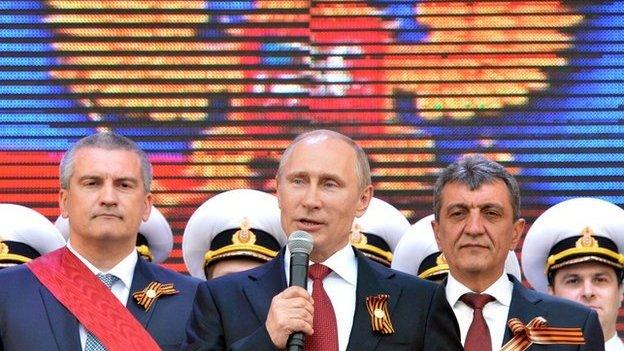Brand Putin: Russia's president still in fashion 15 years on
- Published
Vladimir Putin's popularity is still strong after 15 years, as Sarah Rainsford reports
Fifteen years ago, Vladimir Putin was elected promising to make Russia strong again: a country its citizens could be proud of and that the world would respect.
This week, Russia's main polling agency measured his support rating at 85%.
While opinion polls do not tell the full story in a country where much of the media is under state control, Mr Putin's enduring popularity is undeniable.
"Russia and Putin go together, we just don't see another way," says Oleg Sokolov, a member of the latest pro-Putin youth group known as Set', or "Network".
Set' has its headquarters in a converted Moscow gas tower. The office resembles an internet start-up or a PR firm, strewn with bright-coloured bean bags and dotted with young Russians eating sushi or browsing their iPads.
But the brand they're promoting is Vladimir Putin: his image is plastered all over the walls alongside signs reminding Russians of what makes their country great.
'Not ashamed anymore'
The group won't comment on any formal links to the Kremlin but their passion for the cause is clearly genuine.
"Putin is a strong leader, I'd say the strongest in the world right now," Oleg says.
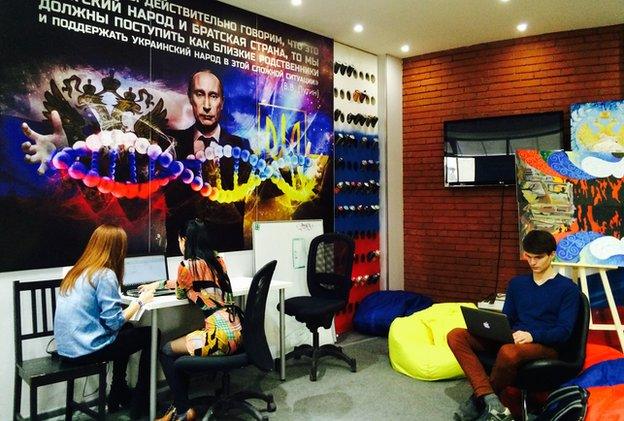
President Putin is plastered on the walls of the office of youth group Set'
He recalls Boris Yeltsin's rule following the Soviet collapse as a time of chaos and humiliation, not the dawn of democracy.
Though he barely reached his teens in the 1990s, the activist talks of "begging" the IMF for funds then and being forced to endure the drunken antics of Mr Putin's predecessor.
"With Yeltsin, I was ashamed that he ran my country. But with Putin, I'm not ashamed anymore."
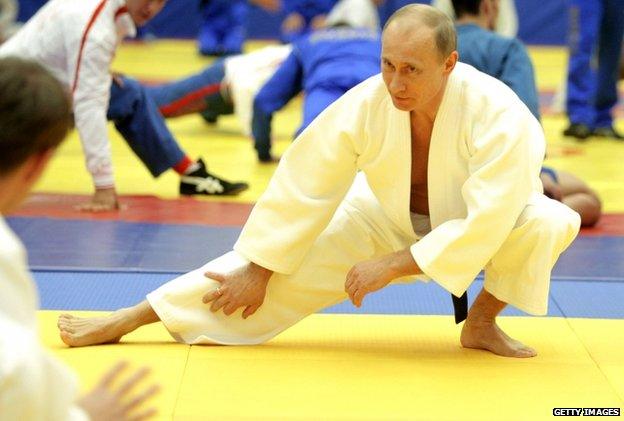
Mr Putin was pictured taking part in a judo training session in December 2010
A former KGB spy, President Putin's image as a man of action has long been part of his appeal. It is carefully maintained through photo shoots: bare-chested on horseback, or tossing opponents onto a judo mat.
But his policy also resonates.
Last week, Russia marked a year since the annexation of Crimea. The move has been widely supported here, despite the heavy financial burden it brings - that was when Vladimir Putin's popularity rating topped 80% for the first time.
Loudly condemned in the West as illegal, in Russia the annexation is presented as reversing the "unjust" transfer of the peninsula to Soviet Ukraine in 1954.
Some also clearly revel in a post-Soviet Moscow starting to flex its political muscle.
'Political chocolates'
The sanctions imposed by the West in response - together with a slump in the oil price - look set to push the economy into recession this year.
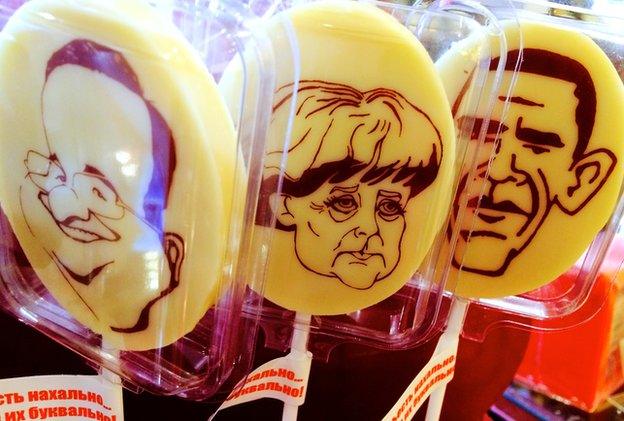
People can bite the heads off Western leaders with these lollipops
A prolonged crisis, which many anticipate, is likely to eat into support for President Putin - especially amongst the middle class who gained most during the boom years. Prices are already rising and jobs are being cut.
But so far the mood is largely resilient.
"The sanctions make it difficult to do business," admits Roman Eldarkhanov, co-owner of Confael chocolates.
He describes problems paying suppliers as well as accessing raw materials from Europe. But the businessman lays the blame with those Western leaders who have imposed the sanctions rather than President Putin and his policies.
So he has created a "political chocolates" collection that includes lollipops modelled on Western heads of state to devour and destroy.
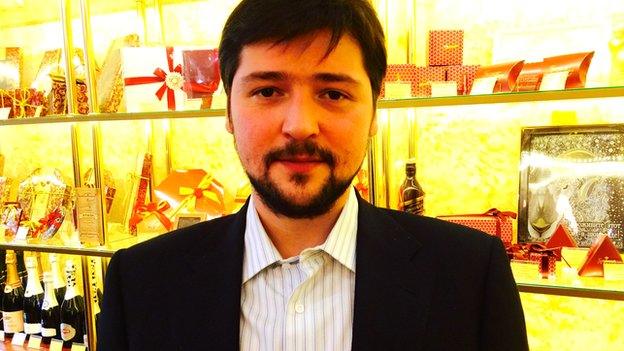
Roman Eldarkhanov's business Confael chocolates is now capitalising on the rise in patriotism
"We are supporting our leader, we think he is doing his job well," Mr Eldarkhanov explains, revealing one chocolate box that displays a macho close-up of Putin's face, in dark glasses.
The slogan reads: "You need balls to be a King, when all around are mere pawns."
"Of course we are earning less money now but we don't care, as it's a question of our country," Mr Eldarkhanov adds, chiming with the patriotic mood here.
'No choice but Putin'
Russia's state-run media has played a major role in shaping such views.
President Putin made controlling the airwaves a priority when he came to power: satirical shows mocking senior figures swiftly disappeared.
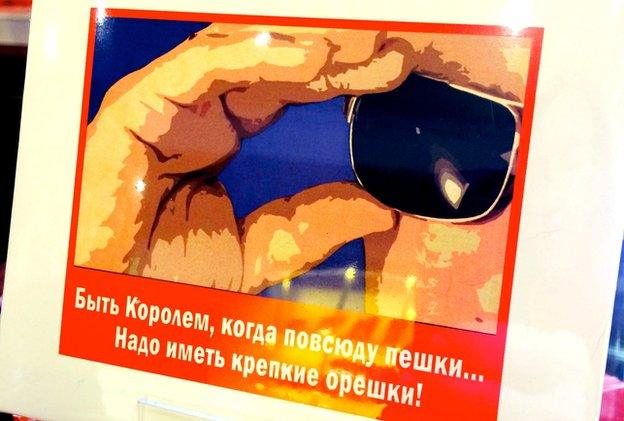
A Putin-themed chocolate box reads: 'You need balls to be a King, when all around are mere pawns'
Fifteen years later, the result is a monochrome landscape of state-controlled channels that mouth the same anti-Western rhetoric without a word of criticism for the president.
"In Russia, the role of TV channels is much more than in the US or Europe," media analyst Dmitry Nekrasov points out, as 90% of Russians get most of their information from TV.
For around 55%, TV is their only source.
So he argues that part of President Putin's popularity stems from the fact many people literally don't see any alternative.
"Real opposition is not allowed onto the main channels," he says. "And if a politician is not allowed on state TV, he doesn't exist. We are always told there is no choice, but Mr Putin."
Emblazoned with his face
Plenty of Russians do seem content with that option, though.
They are the target market for all the Putin manicures and T-shirts now available, as well as tablet and phone covers with the president's face on them.
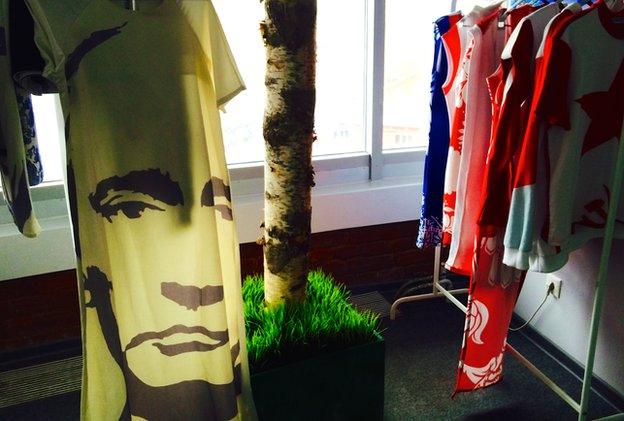
Fans of Vladimir Putin can buy clothes with his face on
Back at Set' - the youth group - a designer has created a Putin fashion line: a long silky dress and a sweatshirt emblazoned with his face hang between two birch trees.
A few metres away in a display cabinet are silver rings adorned with somewhat ghoulish mini-heads of the president.
And for activist Oleg Sokolov, Mr Putin's lengthy time in office has not blunted his appeal, but quite the opposite.
"If he continues the politics he's led for the past 15 years," he says, "I'd be very happy for Vladimir Putin to stay on for another 15 at least. If that were possible."
- Published16 March 2015
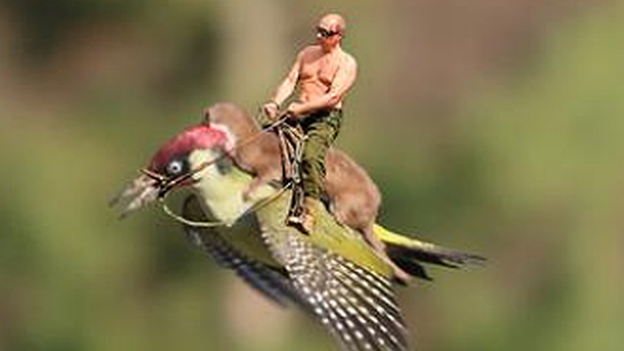
- Published7 October 2014
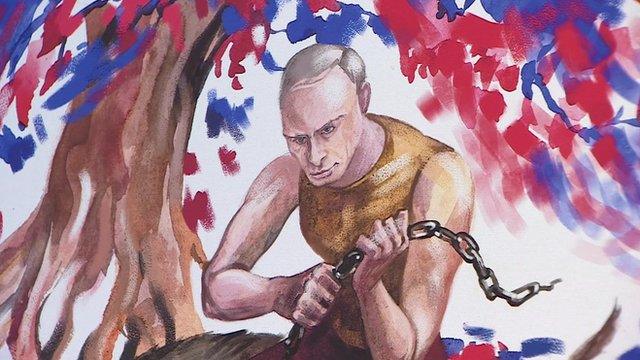
- Published6 June 2014
